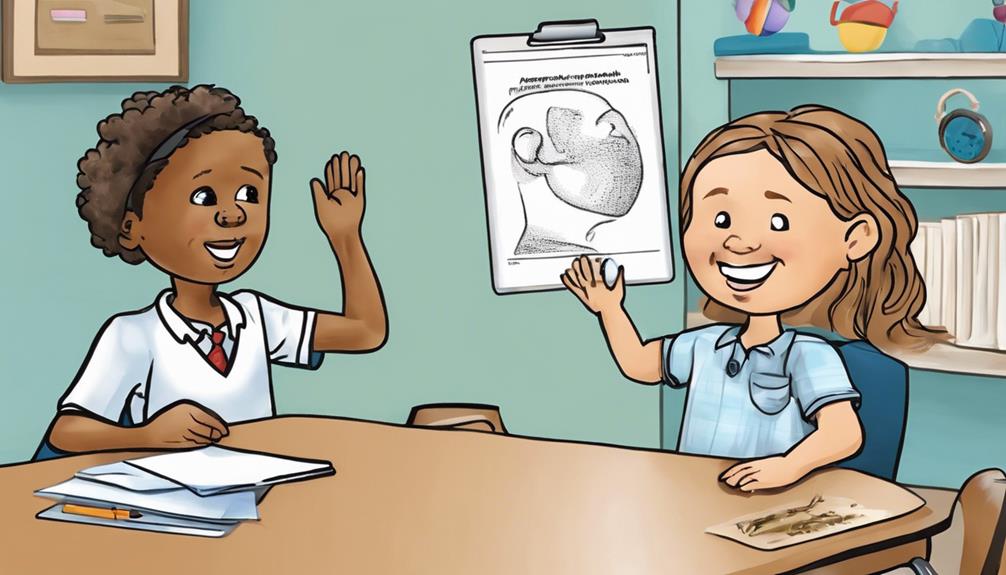Exploring the realm of auditory therapy uncovers numerous opportunities waiting to be discovered. The impact of auditory therapy on hearing health goes beyond surface-level, offering a chance to enhance our listening experiences.
By unraveling the layers of this therapeutic approach, we unearth a world where sounds become clearer, communication flows smoother, and connections with our environment deepen.
Join us on this journey as we unravel the mysteries of auditory therapy and its profound influence on our hearing well-being.
Key Takeaways
- Enhances listening skills and communication abilities
- Manages tinnitus symptoms effectively with tailored therapies
- Improves speech understanding and auditory processing
- Optimizes hearing abilities for better communication and daily interactions
Benefits of Auditory Therapy
Exploring the transformative benefits of auditory therapy, we delve into its profound impact on enhancing listening skills and communication abilities for individuals facing hearing challenges. Auditory training plays a crucial role in helping individuals with hearing aids or cochlear implants interpret sounds effectively, leading to improved speech development and understanding of spoken language. By actively participating in auditory therapy, individuals can enhance their cognitive skills related to hearing, ultimately contributing to a better quality of life.
Research indicates that auditory therapy is beneficial for individuals of all ages, including children and adults with varying degrees of hearing loss. Through targeted auditory training, individuals can optimize their auditory experiences, improving their ability to engage in conversations, follow instructions, and participate in social activities more effectively. This not only enhances their listening skills but also boosts their overall communication abilities, fostering a sense of connection and inclusivity in their personal and professional lives.
Enhancing Speech Understanding

Enhancing speech understanding through auditory therapy involves honing listening skills to better interpret and process spoken language, ultimately improving communication abilities. By participating in therapy sessions, individuals can work on developing their auditory processing abilities, allowing for improved speech comprehension. Through targeted exercises and techniques, auditory therapy aims to optimize speech understanding in various situations, including challenging environments where background noise may interfere with communication clarity.
Improving speech understanding through auditory therapy can have a positive impact on overall hearing health. Sharpening listening skills not only enhances the ability to interpret spoken language accurately but also contributes to better communication outcomes in daily interactions. As individuals engage in auditory therapy sessions, they can expect to see progress in their ability to understand and respond to verbal instructions, conversations, and other auditory stimuli. Ultimately, the goal is to empower individuals with the tools and skills needed to navigate the auditory world with confidence and clarity.
Managing Tinnitus With Auditory Therapy
Tinnitus therapy through auditory therapy focuses on alleviating symptoms of chronic ringing or buzzing in the ears. This specialized form of treatment commonly incorporates counseling and sound stimulation techniques to help individuals effectively manage and reduce their perception of tinnitus. Dr. Brandy Vowell and Tulsa Audiology Services offer tailored tinnitus therapy services in Tulsa and northeast Oklahoma, addressing the emotional and lifestyle impacts of persistent tinnitus. By providing personalized strategies, auditory therapy aims to enhance the overall well-being of individuals struggling with tinnitus.
The emotional toll of persistent tinnitus can be significant, impacting daily life and overall quality of life. Through auditory therapy, individuals can learn coping mechanisms and receive support to better manage the emotional challenges associated with chronic ringing in the ears. Additionally, sound stimulation techniques utilized in tinnitus therapy can help mask the perception of tinnitus, providing relief and improving the individual's ability to focus and engage in daily activities. The Hearing Doctor offers comprehensive audiological care, including specialized tinnitus therapy, with a focus on enhancing hearing health and overall quality of life.
Improving Hearing Abilities

Improving our hearing abilities is crucial for enhancing communication skills and overall quality of life, especially as cognitive functions may decline with age. Auditory therapy plays a key role in enhancing listening skills, aiding in detecting softer sounds vital for effective communication.
It's essential to have realistic expectations regarding the benefits of hearing aids and to incorporate strategies for clear speech teaching and managing noisy environments into therapy sessions. Assistive technology, when used alongside hearing aids, can further enhance communication outcomes. Joining self-help groups can provide additional support and guidance.
Interactive training programs like LACE, closed-captioned TV, and audio books are valuable tools in improving listening skills through auditory therapy. These programs offer engaging ways to sharpen cognitive skills required for effective listening. By actively participating in such programs, individuals can develop better auditory processing abilities, leading to improved communication in various settings.
Embracing these resources and strategies can significantly contribute to enhancing one's overall hearing abilities and quality of life.
Connecting With the World of Sound
Connecting individuals with hearing loss to the world of sound involves specialized techniques and training aimed at enhancing listening skills, speech comprehension, and overall auditory processing abilities. By actively participating in auditory therapy, individuals can improve their communication strategies and adapt to various listening environments. Programs like the LACE program offer practical exercises and interactive training to optimize the hearing aid experience. Embracing auditory retraining challenges can lead to significant improvements in auditory skills and overall hearing health.
- Enhancing Listening Skills: Auditory therapy focuses on improving the ability to accurately perceive and interpret sounds.
- Improving Speech Comprehension: Through targeted exercises, individuals can enhance their understanding of spoken language.
- Developing Communication Strategies: Learning effective ways to communicate in different situations is a crucial aspect of auditory therapy.
- Optimizing Listening Environments: Strategies are taught to help individuals navigate challenging listening environments effectively.
Frequently Asked Questions
Can Sound Therapy Improve Hearing Loss?
Sound therapy can indeed improve hearing loss by stimulating auditory pathways in the brain. Listening to specific sounds or frequencies can help retrain the brain to interpret sounds more effectively.
When used in conjunction with other interventions like hearing aids, sound therapy has shown promise in enhancing auditory processing and improving speech understanding.
Customized sound therapy programs tailored to individual needs can effectively manage and potentially improve hearing difficulties.
What Are 5 Hearing Interventions That Can Be Done to Help Hearing Patients?
Absolutely!
Five key hearing interventions are:
- Auditory-verbal therapy (AVT)
- Auditory training programs
- Hearing aids
- Cochlear implants
- Speech-language therapy
AVT involves parents in children's speech development, while auditory training enhances processing skills. Hearing aids and implants aid therapy, and speech-language therapy improves communication.
A fascinating statistic is that 95% of children with hearing loss can benefit from early intervention services like AVT.
These interventions are crucial for maximizing communication skills and overall hearing health.
What Are the Benefits of Auditory Verbal Therapy?
Auditory Verbal Therapy (AVT) offers numerous benefits for children with hearing loss. It focuses on developing spoken language skills through active participation of parents and caregivers. Studies indicate that children who undergo AVT excel academically, socially, and in language development compared to those without this therapy.
What Is the Goal of Auditory Training for Persons With Hearing Loss?
The goal of auditory training for individuals with hearing loss is to enhance speech understanding, especially in challenging environments. This training also improves auditory attention skills for those without hearing impairment. Its versatility extends to candidates beyond severe hearing impairments.
Tailored programs may use a companion's voice to enhance spousal communication. Engaging game-like formats in auditory training make the process enjoyable.
Conclusion
In conclusion, auditory therapy is a game-changer for your hearing health. It can transform your ability to understand speech, manage tinnitus, enhance your hearing skills, and connect you with the vibrant world of sound.
Embrace auditory therapy, and watch as your communication skills soar to new heights, allowing you to fully engage with the world around you like never before. Don't miss out on the life-changing benefits that auditory therapy can offer – take the leap and experience the difference today!











